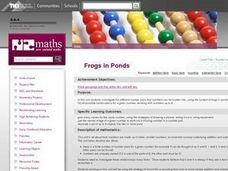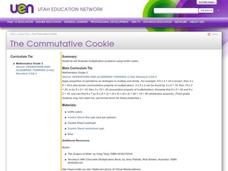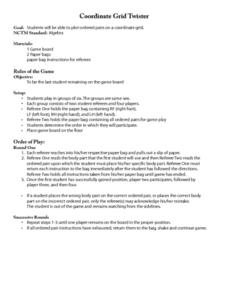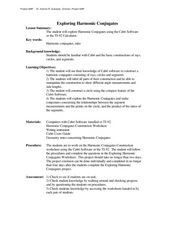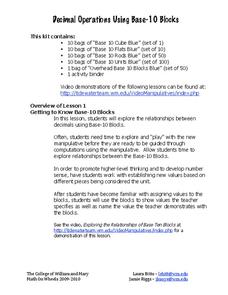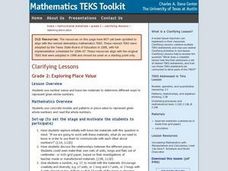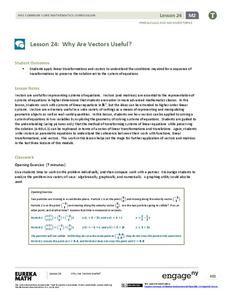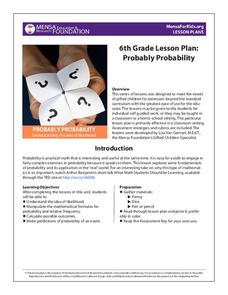Curated OER
Frogs in Ponds
First graders determine how numbers are made up of other smaller numbers before examining addition and subtraction. They determine the number pairs that make up a given number and determine when no other pairs can be found. They use frog...
Curated OER
The Commutative Cookie
Third graders investigate the commutative properties of multiplication and focus upon the setting of cubes in the correct patterns to solve problems. They differentiate between numbers that have multiple factors and prime numbers....
Curated OER
Facing Life's Challenges
Young scholars analyze divination and carry out experiments using a probability model. In this probability lesson, students review information about divination and predictions in various cultures. Young scholars set up experiments to...
Curated OER
Coordinate Grid Twister
Students plot ordered pairs on a coordinate plane. Given a game board and other manipulatives, groups of students participate in a coordinate grid game where they stand and place their feet and hands on a given grid position. Much like...
Pennsylvania Department of Education
Extending Pattern Understandings
Students use shapes and manipulatives to demonstrate patterns. In this patterns lesson plan, students also break up patterns to identify a pattern unit.
Curated OER
All Kinds of Numbers
Count and compare numbers and fractions using "greater than" and "less than." Learners count on by 2s and 10s and represent the end number with base ten blocks, counters, and cups. They use circle stickers to illustrate fractions and...
Curated OER
Exploring Harmonic Conjugates
High schoolers investigate harmonic conjugates using Cabri Software or the Ti Calculator to analyze harmonics. They explore different angles measurements as they move their circles around and solve problems.
Curated OER
"Spooktacular Patterns" - A Math Unit for October
Students extend a pattern using everyday objects. They use sound and objects to make a pattern
Curated OER
Nickel/Penny Grab
First graders examine the coins nickels and pennies. For this math lesson, 1st graders compare the value of the two sets of coins and determine their value. Additionally, students explore counting sets of coins that have pennies and...
Curated OER
Penny Basketball: Making Sense of Data
Explore four web-based interactive sites to develop a baseline understanding of statistics. Learners play a series of penny basketball games and collect data regarding their shooting statistics. Groups decide who is the "top" penny...
Montana Office of Public Instruction
Native American Culture: Counting, 1:1 Correspondence
Kindergarteners practice showing 1:1 correspondence while incorporating information they learned about a local Native American culture. The objects used for counting are taken from the previous day's Native American lesson. The intention...
College of William and Mary
Decimal Operations Using Base 10 Blocks
Let's get this block party started and learn about decimals! Here are four main lessons that teach the operations with decimals while using base 10 blocks to provide a hands-on learning approach. Supplemental worksheets and other...
Curated OER
Grade 2: Exploring Place Value
Creative problem solving is fun and helps kids conceptualize content. They use grid paper, manilla paper, and markers to cut, draw, and show given double-digit numbers as many ways as they can.
EngageNY
Why Are Vectors Useful? 2
Investigate the application of vector transformations applied to linear systems. Individuals use vectors to transform a linear system translating the solution to the origin. They apply their understanding of vectors, matrices,...
Curated OER
The Power of Graphical Display: How to Use Graphs to Justify a Position, Prove a Point, or Mislead the Viewer
Analyze different types of graphs with learners. They conduct a survey and determine the mean, median and mode. They then identify different techniques for collecting data.
MENSA Education & Research Foundation
Probably Probability
Reinforce the concept of probability with a series of lessons highlighting the idea of likelihood, probability formulas, relative frequency, outcomes, and event predictions. The collection is made up of four lessons offering informative...
Curated OER
Prime Factorization: Finding Factors in the Fifth Grade
The lesson starts out with a brain drain, which is a great way to get students to activate prior knowledge and build lasting connections. They tell everything they know about prime factorization, use their knowledge to...
Mathematics Assessment Project
Sorting Equations and Identities
Identify the identity. Learners first solve equations to find the number of solutions. Scholars then determine if given equations are always, sometimes, or never true, leading to the concept of identities.
Utah Education Network (UEN)
Solving Single-Variable Equations Part II
Brainiacs explore the concept of solving single-variable equations.They use inverse operations to solve equations, and participate in activities such as balancing an equation scale. This is an awesome lesson, complete with game...
Curated OER
Conditional Probability and Probability of Simultaneous Events
Your statisticians examine the characteristics of conditional probability and the probability of simultaneous independent events. They perform computer activities to find probabilities for simple compound events. They examine the...
Curated OER
Initial Fraction Ideas Lesson 13: Overview
Here is a good fractions lesson which invites learners to fold paper strips to represent an equivalent fraction to the fraction model using chips or tiles displayed on the overhead. They arrange chips to represent a given fraction.
Shodor Education Foundation
Triangle Area
While the lesson focuses on right triangles, this activity offers a great way to practice the area of all triangles through an interactive webpage. The activity begins with the class taking a square paper and cutting in in half; can they...
Curated OER
Pairs of Whole Numbers
Mathematical reasoning and linear systems are two of the strategies used to solve this number puzzle. Your learners will enjoy the challenge and the variety of ways to approach this challenge.
Curated OER
Measurement: 2D and 3D
Students solve volume problems. In this geometry lesson, the class watches a video about clean water (link provided) and individuals compare the volume of different prisms, including an actual drinking glass. Extension activities include...
